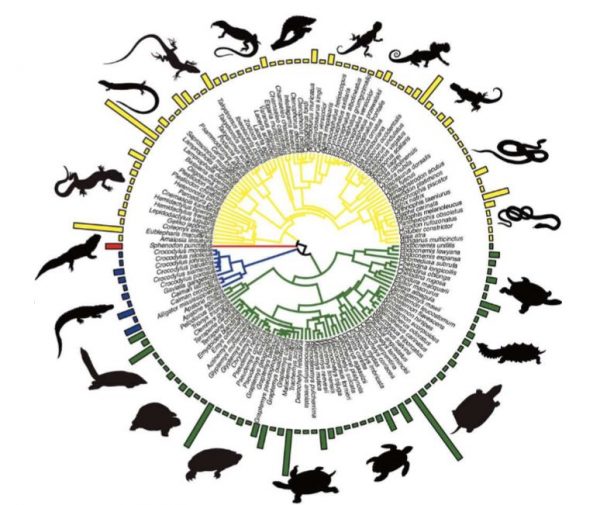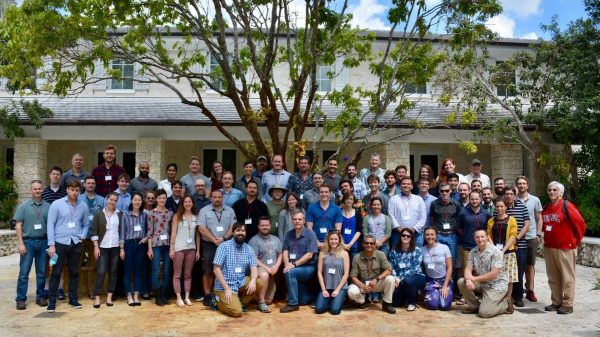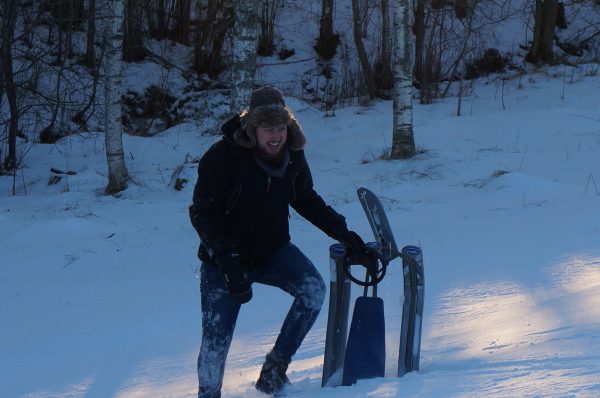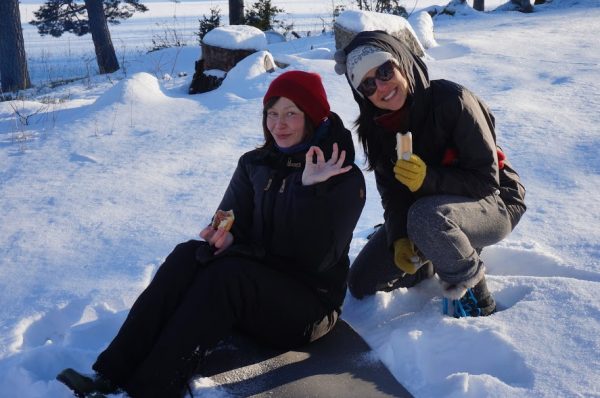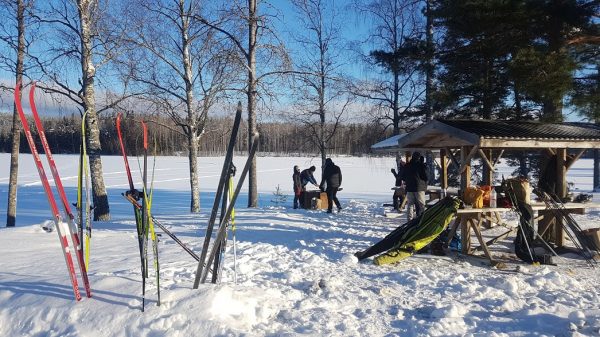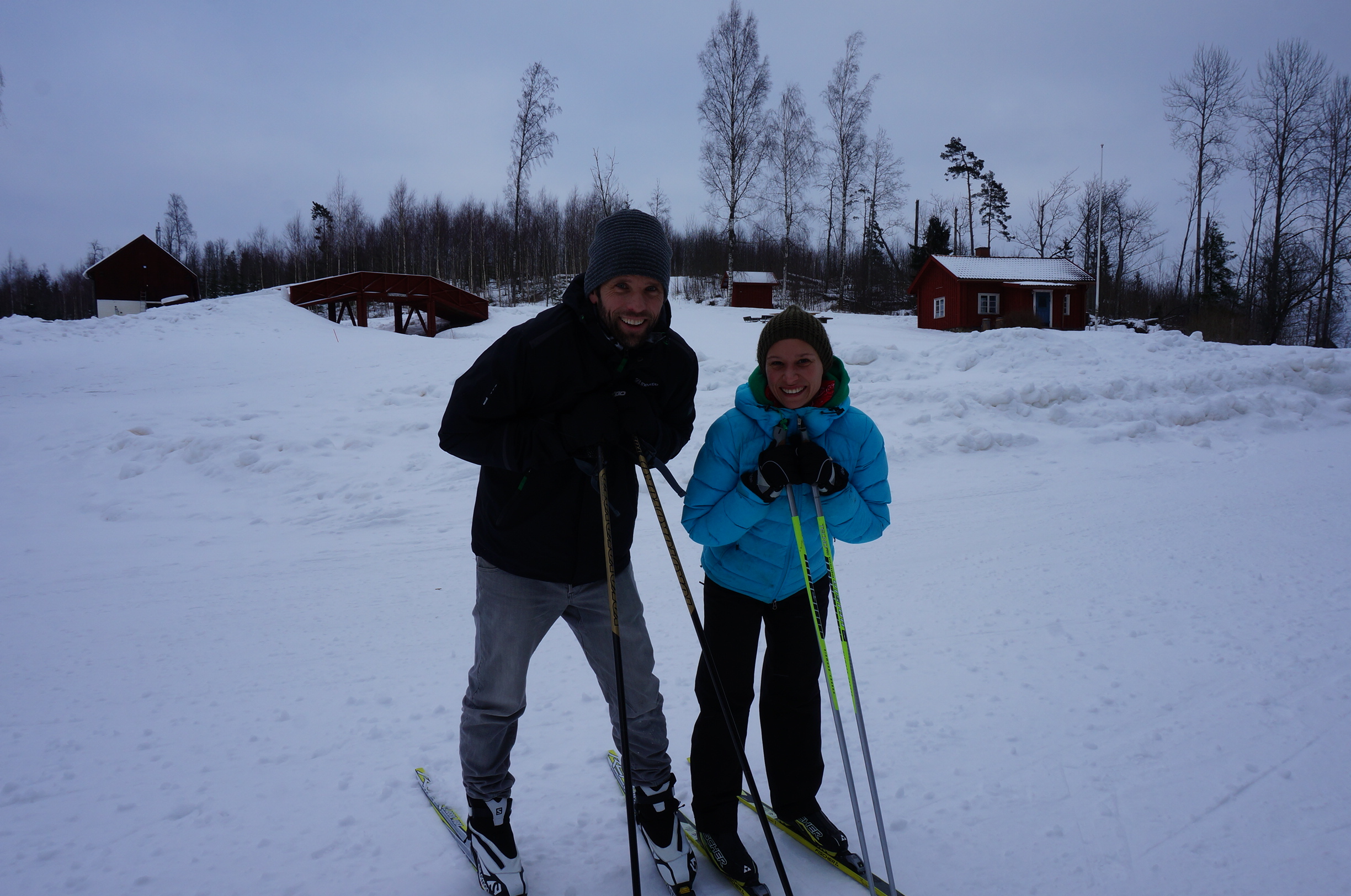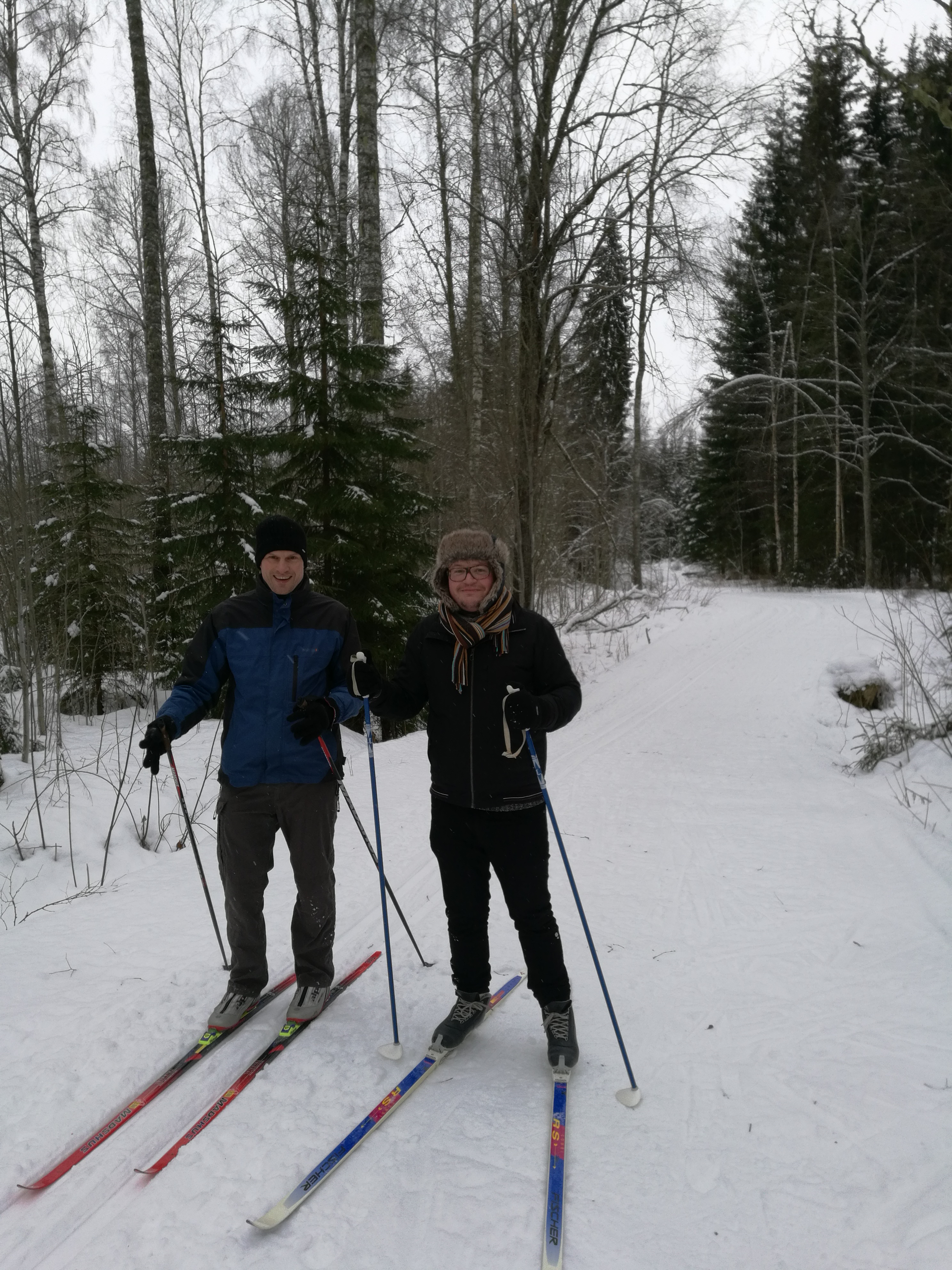Developmental Bias and Evolution
A recurrent theme in evolutionary biology is to contrast natural selection and developmental constraint – two forces pitted against each other as competing explanations for organismal form. A recent Perspective in the journal Genetics explains why this juxtaposition is deeply misleading. There is also a blog about the paper here.
Our starting point is that characters often evolve through changes in how genes, cells, and tissues regulate each other. Once we study the evolution of such regulatory interactions, it turns out that they do not only limit evolution, but also may facilitate the capacity to adapt and diversify. The paper gives an introduction to recent theoretical and empirical research, and explains how this work is now beginning to reveal how evolution of the evolutionary process itself contributes to diversification and adaptation.
Read More
Three new papers on thermal biology of reptile embryos
Most reptiles lay eggs in sand or soil, under logs or in rock crevices. These are places where the temperature often fluctuates, sometimes becoming dangerously high or low. The pervasive effects of temperature on biological systems begs the question how embryos respond in the short term, and how populations adapt in the long term. This question is now thoroughly explored in a theme issue of the Journal of Experimental Zoology, with contributions from our group.
In a study on wall lizards led by Nathalie Feiner, we reveal a pervasive effect of temperature on gene expression in early embryos. The strongest responses were found for genes involved in transcriptional and translational regulation and chromatin remodelling, suggesting possible epigenetic mechanisms underlying thermal acclimation. In another paper, ploughing through 50 years of experimental studies, Dan Noble, Geoff While, and colleagues summarize research on thermal plasticity in reptile embryos, and demonstrate how future progress can be made through meta-analytic and comparative work. The data are accessible to everyone through a paper in the journal Scientific Data, and can be downloaded through this online data base. More papers in this special issue are available through the Journal of Experimental Zoology online early.
Read More
Anolis symposium in Miami
The organizers had chosen an appropriate setting for the 2018 Anolis symposium – sunny Miami, Florida, at the Fairchild Botanical Garden that ‘hosts’ six Anolis species. Since Nathalie was working at the museum collection of the University of Florida, she took the opportunity to join for two days of Anolis fun.
The meeting was the fifth of its kind, with the first taking place already in 1972. That is an average of one meeting every 9th year! Not very frequent, but it means the symposium already is a classic event. The program was full, but the organizers had scheduled long coffee and lunch breaks to make sure there was enough time to explore the Botanical Garden, in particular to meet our scaly friends, of course.
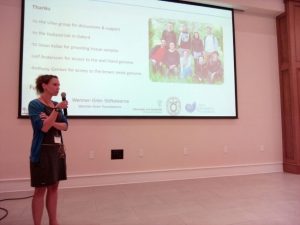 There were 31 talks. These covered pretty much every question that can be asked about Anolis lizards: behaviour, ecology, population biology, developmental biology, genome biology and evolution. Several talks were on urban ecology since many Anolis species have developed a taste for busy metropolitan environments, something that is easily observed in Miami. Most speakers presented ongoing work which generated a lot of fruitful discussions. Nathalie presented her work on the relationship between transposable elements (TE) and diversification rates in Anolis, and how transposable elements may be responsible for some pretty cool changes in Hox gene expression. TEs were new to many in the audience, but Nathalie managed to get the ecologists excited about genome biology.
There were 31 talks. These covered pretty much every question that can be asked about Anolis lizards: behaviour, ecology, population biology, developmental biology, genome biology and evolution. Several talks were on urban ecology since many Anolis species have developed a taste for busy metropolitan environments, something that is easily observed in Miami. Most speakers presented ongoing work which generated a lot of fruitful discussions. Nathalie presented her work on the relationship between transposable elements (TE) and diversification rates in Anolis, and how transposable elements may be responsible for some pretty cool changes in Hox gene expression. TEs were new to many in the audience, but Nathalie managed to get the ecologists excited about genome biology.
The talks were great. But the best thing about the symposium was to meet other Anolis enthusiasts and to talk (and see!) ‘Anolis’ for a whole weekend! For Nathalie – the only representative of the old world, as pointed out by Jonathan Losos – it was a fantastic opportunity to exchange ideas with those who shared an interest in evo-devo. There was a lot of successful exchange of ideas – from practical matters like the best way to image embryos, to the conceptual issues surrounding the role of development in evolution.
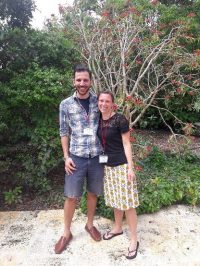
And look who turned up! Sozos Michaelides – who finished his PhD in our group three years ago – has abandoned the wall lizards and is now disentangling the introduction histories of Anolis lizards with Jason Kolbe at Rhode Island.
Thanks to James Stroud, Anthony Geneva and Jonathan Losos for a fantastic job with the organization. James, the local amongst the organizers, made sure that everyone got a taste of the Caribbean – serving Cuban delights during coffee and lunch breaks, and homebrewed beer (‘Lizard lager’ and ‘Anole ale’) in the evening. The next meeting is scheduled for the year 2025 – we look forward to it!
Read More
Evolving Evolutionary Biology at the Santa Fe Institute
Researchers from around the world gathered at a snow-covered Santa Fe Institute to discuss the evolutionary implications of extra-genetic inheritance. The workshop – Integrating Development and Inheritance – was organized by Tobias and colleagues as part of the EES research program. For two and a half days the participants – biologists, mathematicians, computer scientists, anthropologists, historians and philosophers of science – presented their work and took part in lively and constructive discussions about the nature of inheritance and why it matters to evolution.
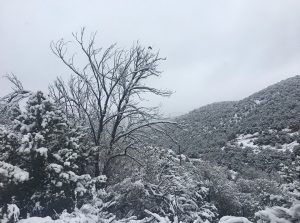 The workshop kicked off with some historical background to the separation of inheritance and development, and how this shaped the development of research programs within evolutionary biology. The biology talks covered many different mechanisms by which parents influence the development of their offspring – from epigenetic inheritance in plants to whale culture. Attendees further discussed how empirical work and mathematical modelling best can proceed with constructive views of development and inheritance. For the full program, please see here.
The workshop kicked off with some historical background to the separation of inheritance and development, and how this shaped the development of research programs within evolutionary biology. The biology talks covered many different mechanisms by which parents influence the development of their offspring – from epigenetic inheritance in plants to whale culture. Attendees further discussed how empirical work and mathematical modelling best can proceed with constructive views of development and inheritance. For the full program, please see here.
We are very grateful to all the participants for their outstanding presentations and engaging and constructive contribution to the discussions. Nothing beats learning about one’s own field through talking to people with different backgrounds and expertise. Judging from the talks, we have a lot of exciting empirical and theoretical research and philosophy and history of science to look forward to. An extra thanks to Michael Lachmann and the Santa Fe Institute for hosting us. We will be back in November!
Read MoreTwo PhD positions available to study the evolutionary origin of family living
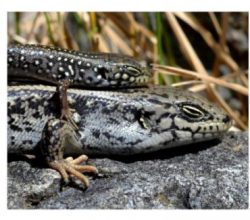 We are looking for two students interested in doing their PhD on the evolutionary origin and diversification of social complexity in lizards. The positions are part of a research project funded by the Australian Research Council and the successful candidates will be based either at the University of Tasmania (primary supervisor Geoff While) or at Macquarie University (primary supervisor Martin Whiting). The Lund collaborators are Tobias and Charlie Cornwallis. For more information on the position, please read here, or contact any one of us directly.
We are looking for two students interested in doing their PhD on the evolutionary origin and diversification of social complexity in lizards. The positions are part of a research project funded by the Australian Research Council and the successful candidates will be based either at the University of Tasmania (primary supervisor Geoff While) or at Macquarie University (primary supervisor Martin Whiting). The Lund collaborators are Tobias and Charlie Cornwallis. For more information on the position, please read here, or contact any one of us directly.
Winter is coming!
 Winter is not really the best time of year in Skåne, unless you really enjoy all those different shades of grey. To get a feeling of a proper Swedish winter, the group packed their warmest clothes (and triple pairs of socks) and headed up to Sunne, where Tobias was born and raised. Winter in Värmland is the real thing – snow-covered forests, ice-covered lakes and the hope of a rare wolf spotting.
Winter is not really the best time of year in Skåne, unless you really enjoy all those different shades of grey. To get a feeling of a proper Swedish winter, the group packed their warmest clothes (and triple pairs of socks) and headed up to Sunne, where Tobias was born and raised. Winter in Värmland is the real thing – snow-covered forests, ice-covered lakes and the hope of a rare wolf spotting.
Tobias’ parents opened up their whole house for us, and his brother served as the cross-country skiing coach and ‘vallachef’. People from eight nationalities put on their skis – some for the very first time – and headed out to the tracks. Everybody had healthy rosy cheeks and slightly frozen toes by the end, and incredibly nobody was injured! In fact, Yang and Mara both proved to be natural talents at skiing, despite the limited snow cover in Chengdu and Murcia. This was extra impressive considering that Yang broke his ‘low Celsius record’ two days in a row and had only once seen this much snow before – an occasion he described as “catastrophic”!
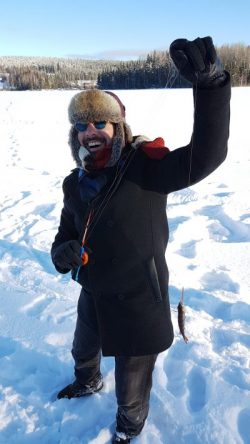 Ice-fishing released a lot of creative forces in the group. Pumping up a groovy atmosphere in the glorious sunshine, Illiam and Alfredo managed to pull up several perch while the others skied across the lake. Back at the house, an old snow racer could of course not be resisted. The greatest daredevil and air-time record-setter was Reinder, perhaps due to limited childhood experience of what happens when you go down hills really fast…
Ice-fishing released a lot of creative forces in the group. Pumping up a groovy atmosphere in the glorious sunshine, Illiam and Alfredo managed to pull up several perch while the others skied across the lake. Back at the house, an old snow racer could of course not be resisted. The greatest daredevil and air-time record-setter was Reinder, perhaps due to limited childhood experience of what happens when you go down hills really fast…
After these lovely but chilly outdoor activities we enjoyed cosy evenings around the fireplace with games and wine. Alex turned out to have the best strategic skills whereas Illiam proved to have the gift of storytelling (a.k.a. lying). Nathalie turned out to be an amazing air pilot, Hanna a master of skull-drumming and Tobias – well, he was still the real Harry even when everyone else had lost track.
Many thanks to the Uller family for an amazing weekend. We’ll see you again next time… ;-)!
Read More

